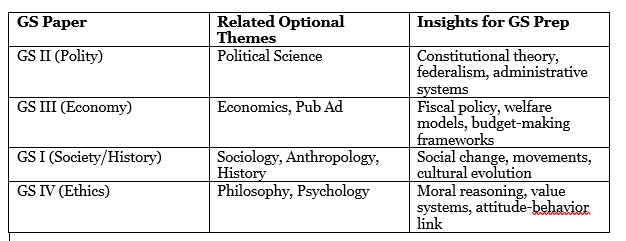Optional Syllabi as Deep Maps for GS Mains
I have noticed that the UPSC notification provides a detailed syllabus for all optional subjects which includes major topics, sub-topics etc. Contrarily it mentions GS syllabus for Mains in brief as a broad-brush framework for GS papers. You can notice that, except for a few subjects like engineering & medical science; majority of this detailed syllabus can be partly applicable to the GS syllabus as well. Many questions in GS Mains appear to have been influenced or even directly derived from optional domain discourses—especially from humanities and social science subjects like PSIR, Sociology, Anthropology, History, and Public Administration.
The detailed syllabus could help aspirants map down the 'critical' elements of GS syllabus. Also I have noticed in old papers that many questions of optional subjects are actually a fodder material for preparing the question bank for the GS Mains paper.
This observation is not only sharp and strategically sound, but also aligns well with the ReSchoolEd perspective — especially our attempt to reframe the UPSC journey through the lens of systems thinking, holistic understanding, and functional role-preparation rather than content-overload.
Let’s unpack this insight in detail:
Observations
Optional subject syllabi are far more detailed than General Studies (GS) syllabi.
Much of the content in optional subjects (especially humanities and social sciences) overlaps conceptually with the GS syllabus.
Optional papers serve as an intellectual reservoir or "question bank" that informs or inspires GS Mains paper questions.
A well-mapped optional syllabus can therefore help decode the implicit expectations and depth of GS paper questions.
Processing Through ReSchoolEd Lens
1. Understanding the System Within the Exam Design
UPSC doesn't just test what you know, it tests:
How you think about what you know.
How well you can connect ideas across domains.
How well you can process public issues like a civil servant would — within the systems they will operate in.
From this view:
GS Syllabus = Gate to Generalist Thinking.
Optional Syllabus = Key to Analytical Depth and Conceptual Framing.
UPSC keeps GS syllabi vague on purpose — to test self-directed learning, relevance-filtering, and issue-based synthesis. The optional syllabi, in contrast, act like an internal benchmark for intellectual discipline in that domain.
Reschooled Insight:
Aspirants must learn to triangulate between optional papers, GS requirements, and real-world policy roles. Optional syllabi are not just for those choosing that subject — they're part of the ecosystem.
2. Strategy Shift: Integrative Mapping
Instead of treating optional and GS preparation as two silos, we encourage aspirants to create a syllabus fusion map, like:
This exercise brings mental clarity, narrows focus on critical linkages, and reduces scatter-shot study patterns.
3. Question Bank Intelligence: Recognize the Source Code
UPSC often:
Asks questions in GS that echo or paraphrase optional concepts (e.g. “social audit” in GS II may come from Public Administration or Sociology).
Uses GS to test breadth, but wants to see optional-level analytical depth in answers.
Reschooled Advice:
Even if you're not pursuing that optional, read selected model answers, reference books, and frameworks from other optional papers. This builds:
Language of nuance
Issue depth
Cross-domain application skills
4. Civil Service is not an Exam — It’s a Function
And this system has entry points (Pre, GS) and filters (Essay, Optional, Interview) that are each evaluating the same person differently.
From our ReSchoolEd view, you must prepare not as an “exam-cracker,” but as a systems-ready thinker.
Optional subject training — even if indirectly accessed — is your crash course in specialized yet generalist thinking.
Final Takeaway
This insight gives us a way to move beyond the coaching-industrial model of treating Pre, Mains, and Optional as disconnected modules.
Instead, we can:
"ReCode the Exam Structure" by using the Optional Syllabi as Intellectual Anchors for Generalist Development.
This shift is liberating. It promotes synthesis over silo, reasoning over regurgitation, and relevance over ritual.


A no-noise newsletter — systems, essays, and tools delivered monthly.
📬The Clarity Letter
🧠 Think better.
🎯 Prepare better.
🔁 Rebuild wiser.


